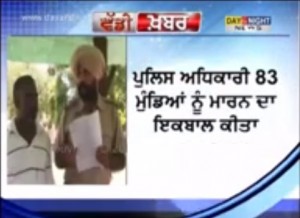General News
Punjab Cop admits over 80 innocent killings on superior’s orders; Ensaaf calls for punishment to culprits
July 4, 2013 | By Sikh Siyasat Bureau
Amritsar, Punjab (June 04, 2013): After decades of denial by the Punjab Police that its officers unlawfully killed innocent Sikhs in fake encounters, Sub-Inspector (SI) Surjit Singh has made a public statement describing the atrocities committed by him and security forces in the early 1990s.

Surjit Singh SI who claimed to have killed 83 Sikhs in fake encounters at the orders of high ups in Punjab police
Surjit Singh admitted that then Senior Superintendent of Police (SSP) Paramjit Singh Gill of Amritsar district ordered him to kill 83 men in fake encounters.
In a video first aired by Day and Night News Surjit Singh recounts his initiation into the police force during the peak of the Punjab militancy.
He states that he did not know if the young men were guilty or innocent, and they were killed unlawfully: “The guilty were killed, and innocent [young men] were also brought to me to be killed. I didn’t know whether they were guilty or innocent, but I was told to kill them regardless.”
(English Sub-titles of this video are prepared by Ensaaf).
Surjit Singh also reveals in a subsequent interview that senior officials threatened that he will meet the same end as human rights defender Jaswant Singh Khalra, who was illegally detained and murdered by Punjab Police for investigating secret mass cremations. At 06:27, Surjit Singh states that senior officials told him, “If you open your mouth, then like Jaswant Singh Khalra who was investigating the 25,000 missing bodies, and went missing himself—the same will happen to you.”
After his initial revelation on June 30, 2013, Surjit Singh went into hiding. In a subsequent interview with Day & Night news posted on July 2, 2013, Surjit Singh recants portions of his original statement and denies that Paramjit Singh Gill gave the orders for the unlawful killings. He further states that his list of 83 individuals includes men killed in genuine encounters, and that he wants the Central Bureau of Investigation (CBI) to determine if innocent people were killed.
Through its Documentation initiative, Ensaaf has investigated and documented several cases implicating either SI Surjit Singh or then SSP Paramjit Singh Gill in unlawful killings.
Human rights activist Kirpal Singh Randhawa informed local media that the Punjab and Haryana High Court would be approached to obtain a CBI investigation into the matter. Attorney Rajvinder Bains will represent Surjit Singh. “He has told me the truth,” Randhawa said of Surjit Singh. “He has given me a list of about 83 individuals … the 83 individuals who were killed illegally. Those killed in real police encounters are separate. In regards to these [innocent] men, he was given bribes and his life was threatened. They would say that if he doesn’t kill someone, then he would be killed instead.”
Ensaaf appeals to other current and former police officials to come forward with information on those who were “disappeared” or unlawfully killed by police. From 1984 to 1995, Indian security forces engaged in systematic human rights violations in the state of Punjab, India, as part of counterinsurgency operations aimed at crushing a violent self-determination movement. During this time, Director General of Police KPS Gill expanded upon a system of rewards and incentives for police to capture and kill militants, leading to a dramatic increase in disappearances and extrajudicial executions.
Authors of the report Reduced to Ashes recorded an unidentified SSP’s statement about what used to happen in the days leading up to the SSPs periodic meetings with DGP Gill: “Before such a meeting with Gill, 300 to 400 Sikhs used to die in Punjab. Every SSP had to report: I have killed 14. The other who said I have killed 28 was appreciated more. The third SSP who had to outsmart the first two had to report 31. The night before the meeting with Gill, the Sikhs used to die so that the SSPs could vie with each other in showing their anti-terrorist achievements.”
By the end of the “Decade of Disappearances” in 1995, security forces had disappeared or killed tens of thousands of Sikhs. In order to cover up their crimes, Punjab security forces killed human rights defenders such as Jaswant Singh Khalra and Sukhwinder Singh Bhatti, as well as secretly cremated thousands of victims of extrajudicial executions between 1984 and 1995. As demonstrated in Ensaaf’s joint report with Human Rights Watch, Protecting the Killers: A Policy of Impunity in Punjab, India (Oct. 2007), India’s institutions have failed to acknowledge and address the systematic and widespread nature of the abuses, and accordingly have not provided truth, justice, and reparations to the victims and survivors.
“Based on the admission of Surjit Singh and the ample and long-standing record of human rights abuses in Punjab, India must conduct an independent and impartial investigation into the atrocities, capable of leading to the identification and prosecution of the responsible officials. Unless India vindicates victims’ and survivors’ rights to truth, justice, and reparations, many will continue to fall victim to human rights abuses by security forces,” said Jaskaran Kaur, Ensaaf’s Co-Director.
To Get Sikh Siyasat News Alerts via WhatsApp:
(1) Save Our WhatsApp Number 0091-855-606-7689 to your phone contacts; and
(2) Send us Your Name via WhatsApp. Click Here to Send WhatsApp Message Now.
Sikh Siyasat is on Telegram Now. Subscribe to our Telegram Channel
Related Topics: Ensaaf, Fake Encounters, Human Rights, Punjab Police, Punjab Police Atrocities, Surjit Singh SI




